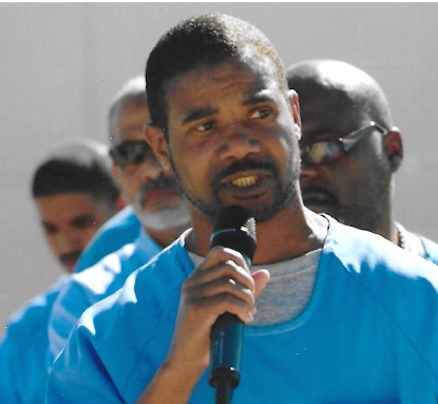
Dortell Williams is in his 36th year of a Life without Parole sentence. Dortell is an Inside Policy Fellow with Ella Baker Center. He has a paralegal degree, four Associate of Arts Degree and in 2021 graduated with a BA degree in Communication Studies from Cal State University Los Angeles (graduated Summa Cum Laude) He is currently enrolled in the Master’s program at Cal State Dominguez Hills. He is an accomplished, award-winning essayist.
‘Our experiences and our faith have historically clothed us in empathy for others. Immigration is a world citizen issue, but if not that, then it is certainly a Black issue. . . . ‘
Richard Wright, our celebrated American author of Native Son, was a “national” refugee. In 1927 Wright fled to Chicago to escape stifling racial oppression and caste poverty during the Great Migration.
Of course, “refugee” is traditionally defined as fleeing from one country to another. Yet it should be noted that modern land ownership and borders are a colonial concept. Still, the debilitating circumstances for which the array of oppressed flee hardship flows back into history to Exodus of the Bible, and beyond.
Isabel Wilkerson, author of The Warmth of Other Suns describes the exodus of 6 million Black Americans fleeing the Jim Crow south to the north and west. This Great Migration occurred from 1910 to the ’70s. Life for the descendants of those courageous people could look very different for us today if dissidents and state borders had refused Black migrant’s food, water and shelter — or entry for that matter.
Yet today I hear descendants of the Great Migration hating on others fleeing the same types of oppression or worse from abroad. The fact is, between 2009 and 2014 there was a precipitous decline in migrants coming from Mexico into the U.S. That pattern holds today.
Nevertheless, historically there has been a consistent element in the American fabric that strives to divide and even purge some of us from the American electorate.
These nefarious strategies break up families, spark bias between historically oppressed groups, and cause lasting physical and psychological harm. The chief tactic has been the use of labels: Black men were a threat to “their” women; Japanese Americans were a threat after Japan attacked Pearl Harbor; Black youth are “superpredators,” and young people who commit serious harm cannot change and should remain in prison forever.
Borrowing from the 1980’s playbook, the lie is being promoted that Black jobs are being stolen by migrants coming from our neighbor country to the south. Yet most economists describe that as a blatant falsehood. Still, people in my own community cite that lie as fact.
We cannot become allies to our own deception. The hard facts are that Haiti has been in turmoil since revolting from France in 1804. Political upheaval has 360,000 displaced. The Democratic Republic of Congo is in civil war with some 5.8 million displaced, and Sudan is enduring a deadly conflict that has exacerbated a famine.
Climate change threatens to bring even more desperation, and with it more lies and more apathy. Our experiences and our faith have historically clothed us in empathy for others. Immigration is a world citizen issue, but if not that, then it is certainly a Black issue.
____
Immigration Part III O’Kane, John (N.D.).
“Fear Mongering, Resource Scarcity, Replacement Theory,” Amass Parkin, Joan (2021, February).
“The Genius of Richard Wright,” Mule Creek Post, Vol. IV, Issue II, p. 6 Wall Street Journal (2024, June 11). “Displaced People Exceed 12 Million,” p. A16
Wilkerson, Isabel (2010). “The Warmth of Other Suns: The Epic Story of America’s Great Migration” (Random House, NY)
Winters, Michael Sean (2017). “Alternative Facts and Fear Mongering: We’ve Seen This Before,” National Catholic Reporter
Dortell Williams is an incarcerated person in his 37th year of a Death by Incarceration sentence. He has educated himself inside, earning a BA degree in Communication Studies at California State, Los Angeles, and is a founding member of Taming Trauma. To learn more about Dortell and support his quest for freedom, go to www.freedortellwilliams.com.

